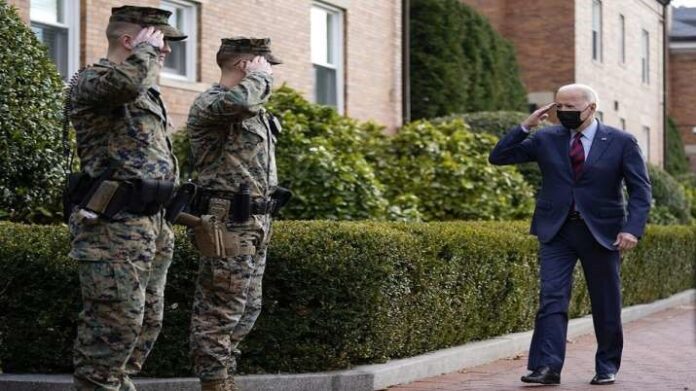| Translate This News In |
|---|
President Joe Biden’s efforts to collect support at home and internationally in the face of a possible Russian invasion of Ukraine are the next major test of his ability to bridge ideological divides and balance opposing interests in order to form effective coalitions.
His track record as president says it’s not a foregone conclusion. As he confronts setbacks on voting rights and his major $2.2 trillion domestic and climate spending programme, Biden is attempting to form the kind of international unity that has evaded him on his home agenda.
Now Obama faces a more difficult and hazardous task: keeping the West united as it confronts what White House officials fear is a more likely Russian President Vladimir Putin-ordered invasion of Ukrainian territory.
The string of adversity is putting the twin cornerstones of Biden’s 2020 campaign to the test: whether he can get things done competently at home and restore America’s international stature after Donald Trump’s tumultuous four years in the White House.
Only roughly a quarter of Americans believe Biden can properly handle the military and advance the United States’ global stature. An Associated Press-NORC Center for Public Affairs Research poll found that nearly four out of ten people have low faith in Biden in these areas. According to the poll, Democrats are less likely to say they have “a great lot of confidence” now than they were when he entered office (48 percent vs. 65 percent).
With a Russian attack becoming more plausible, administration officials have been scrambling to bring NATO members on board.
Biden’s national security advisers have been working on contingency plans with specific European countries, the European Commission, and worldwide suppliers if Russia cuts off energy supply to Europe.
The president has stated numerous times that no US troops will be sent to Ukraine. He has, however, ordered 8,500 troops to be placed on high alert for deployment to the Baltics. On Tuesday, he warned that if Russia takes military action against Ukraine, it will face “enormous consequences” and severe sanctions, including for Putin personally.
“We’re all on the same page,” he declared, after speaking with every NATO ally.
Indeed, Biden maintains there is “absolute consensus” in the Western alliance’s reaction to the situation, citing a secure video chat with several important European leaders on Monday. However, discrepancies can be seen.
Volodymyr Zelenskyy, the president of Ukraine, reacted angrily to Biden’s statement last week that a “small incursion” into Ukraine would have fewer implications for Moscow. The president and the White House responded immediately to state that any invasion of Ukrainian land would result in heavy penalties being imposed on Russia. Ukrainian officials also claimed that the US State Department was “premature” in ordering American Embassy workers and non-essential employees in Ukraine to leave the country.
Meanwhile, Croatian President Zoran Milanovic blamed the escalation of tensions on the Biden administration and “hawks” on both sides of the American political spectrum. Croatia is a NATO member, and its soldiers have served in NATO missions around the world.
As the issue has worsened at home, Biden has been under fire from Republican senators who want the White House to impose penalties on Moscow ahead of schedule. Biden claims that the US has made it plain to Russia that sanctions will be unprecedented and severe, but officials warn that acting before of time will jeopardise any prospect of Russia backing down.
The US had long argued that the pipeline would jeopardise European energy security by increasing Europe’s dependency on Russian gas and allowing Russia to apply political pressure on vulnerable Eastern and Central European countries, particularly Ukraine.
Sen. Ted Cruz of Texas, a potential presidential candidate in 2024, tried unsuccessfully earlier this month to impose penalties on the pipeline, which is complete but not yet operational. If Russia invades, Secretary of State Antony Blinken and other administration officials have stated that gas will not flow through the pipeline.
Trump tried unsuccessfully in his final months in office to drastically reduce the US troop presence in Europe, which they saw as emboldening Russian aggressiveness in the region. White House officials pushed back, saying the GOP criticism should ring hollow.
On Tuesday, Senate Republican Leader Mitch McConnell, who had earlier chastised Biden’s administration for failing to take preventative action against Russia, expressed some support for the president. Biden’s decision to boost military aid and put US soldiers on high alert for deployment to NATO partners in the Baltics, according to the senator, is “encouraging.”
McConnell stated, “It appears to me that the administration is headed in the right path.”


















